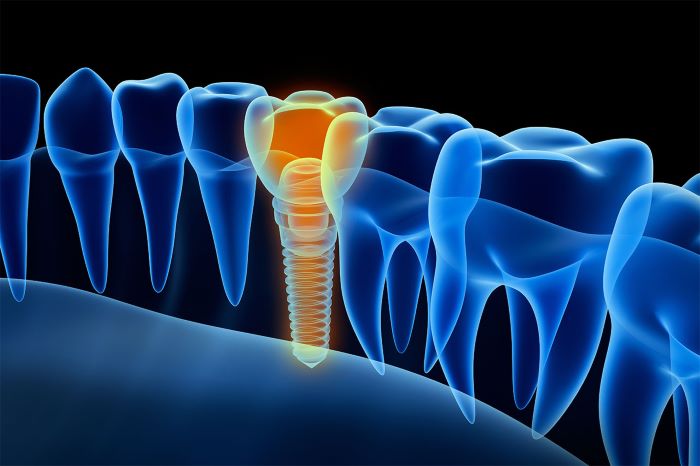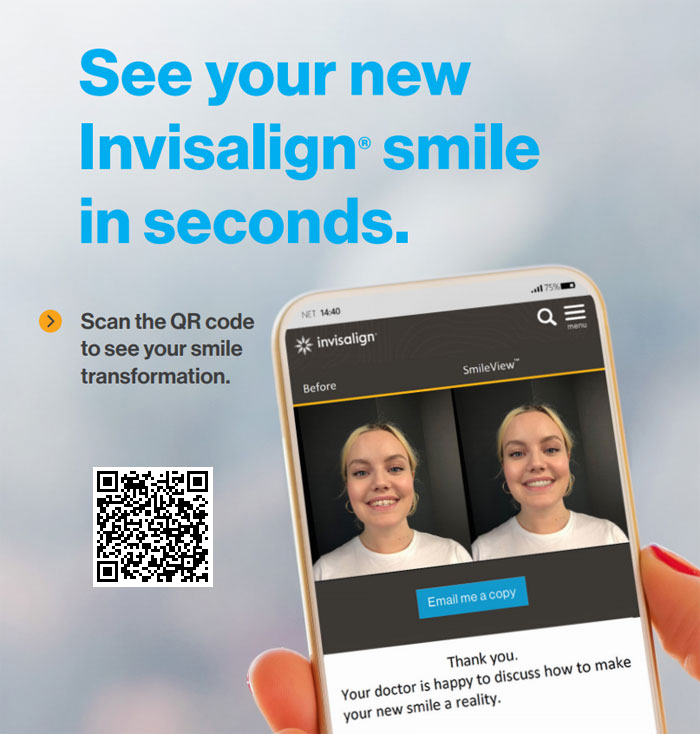Benefits of Dental Implants

Artificial teeth secured by dental implants look and feel extremely natural, which has made them a popular alternative to conventional bridges and dentures. Not only do implants enable you to eat and speak as normal, they do a great job in restoring your smile. Another benefit of dental implants is their high success rate, with a record of long-term effectiveness and dependability. Implants also resist staining, so with routine oral hygiene, you’ll never again be too embarrassed to show off your smile.
Unlike dentures and bridges, which may need replacing with time, dental implants provide a more permanent solution to tooth loss. They actually become part of your jaw. Because implants don’t slip out of place, they avoid the problem of slurred speech that can result from ill-fitting dentures. While many people find dentures troublesome, taking care of implant-retained artificial teeth is just the same as looking after natural teeth.
A further benefit of implants is affordability. Technological advances such as computer-aided design (CAD) and computer-aided manufacture (CAM) mean that implants are now within the financial reach of more people. Many different types of dental implants are now available, including mini and micro varieties of the regular implant. Overdentures and bridges can also be supported by implants.
The aesthetic benefits of dental implants come hand in hand with significant health advantages compared with other tooth replacement methods. Implants are regarded as unique in dentistry in promoting bone growth, which helps to prevent deterioration of the facial structure.
Health Benefits of Dental Implants over Dentures and Bridges
Implants hold several advantages over conventional bridges and dentures.
A dental implant is a small screw-like titanium post that’s surgically inserted into the socket of a missing tooth. Your jaw bone fuses with the biocompatible implant, anchoring it securely in position and providing a solid base for a crown, bridge, or denture.
Dental implants help to preserve the natural shape of your face. Bone in the jaw can waste away without stimulation from a tooth root. While dentures and bridges can’t fix this problem, implants provide an excellent solution as robust tooth root replacements, becoming part of your jaw and maintaining its structural integrity.
Another health benefit of dental implants is a better bite function compared with dentures, which have a biting pressure far less than that of natural teeth, posing the risk of a breakdown of bone. The biting force of dental implants is as powerful as natural teeth. You can eat just about anything you want to, rather than having to avoid certain foods.
Unlike bridges, implants need no adjustments to surrounding teeth, and they help to prevent adjacent teeth from moving out of place.
What Problems Can Dental Implants Fix?
Implants can address multiple issues associated with tooth loss. Many adults in the U.S. have lost at least one tooth. Twenty-five percent of people aged over 65 are missing all their teeth. Commons causes of tooth loss are gum disease, tooth decay, or injury.
Your teeth play a crucial role in maintaining the structure of your mouth and enabling you to speak properly and eat efficiently. Gaps left by tooth loss can have serious repercussions. Just one missing tooth can shift bite force onto other teeth, causing them to move out of position.
Missing teeth also make it easier for plaque to build up. This can result in cavities and gum infections that can lead to the loss of more teeth.
Another problem with missing teeth is the loss of self-confidence that arises from embarrassment about your appearance. Losing just a single back tooth can ruin your smile by twisting your mouth out of shape and making you look older.
Dental implants provide an innovative, state-of-the-art tooth replacement method, considered unique in:
- Restoring confidence.
- Supporting surrounding teeth.
- Providing a powerful bite function.
- Stimulating bone growth.
Why Dental Implants Can Be Your Best Option
Dental implants represent a major advance in dentistry and are now widely used to help people of all ages who have lost teeth. Implants are regarded as the most advanced treatment to replace missing teeth, with a success rate of up to 98 percent – the highest success rate of any type of implant surgery.
The National Center for Biotechnology Information (NCBI) says dental implants are the best tooth-replacement option for the present and the future.
The American Academy of Implant Dentistry (AAID) says millions of adults in the States are missing all their lower or upper teeth, or both, and the number of patients opting for dental implants is rising rapidly. According to the AAID, implants are suitable for anyone in good overall health whose jaw has fully developed.
Even if you’re lacking bone volume in your jaw, dental implant treatment may still be an option. This situation can arise if teeth have been missing for some time. The solution is a bone graft ahead of the implant procedure. Graft material is taken from the patient or an external source.
Versatility of Dental Implants
Versatility is one of the many benefits of dental implants. They can be used to replace a single tooth, several teeth, or all your teeth, and to anchor bridges, partial dentures, and complete dentures.
Dental implant systems include:
- Standard implants the same size as a tooth.
- Smaller mini implants and micro-implants.
- Implants for overdentures.
- Implants for fixed bridges.
- Implants in conjunction with orthodontic care.
Ask an Expert about the Benefits of Dental Implants
Implants can give you back your smile and self-regard, and enable you to enjoy your favorite foods again. They preserve your jaw structure and provide a bite force far more powerful than dentures. Implants also give adjacent natural teeth stability and can last for decades.
If you’re thinking about taking advantage of the many benefits of dental implants, an experienced implant dentist can help you decide whether this cutting-edge tooth replacement system is right for you.






Please login to publish a comment.
Comments (0)